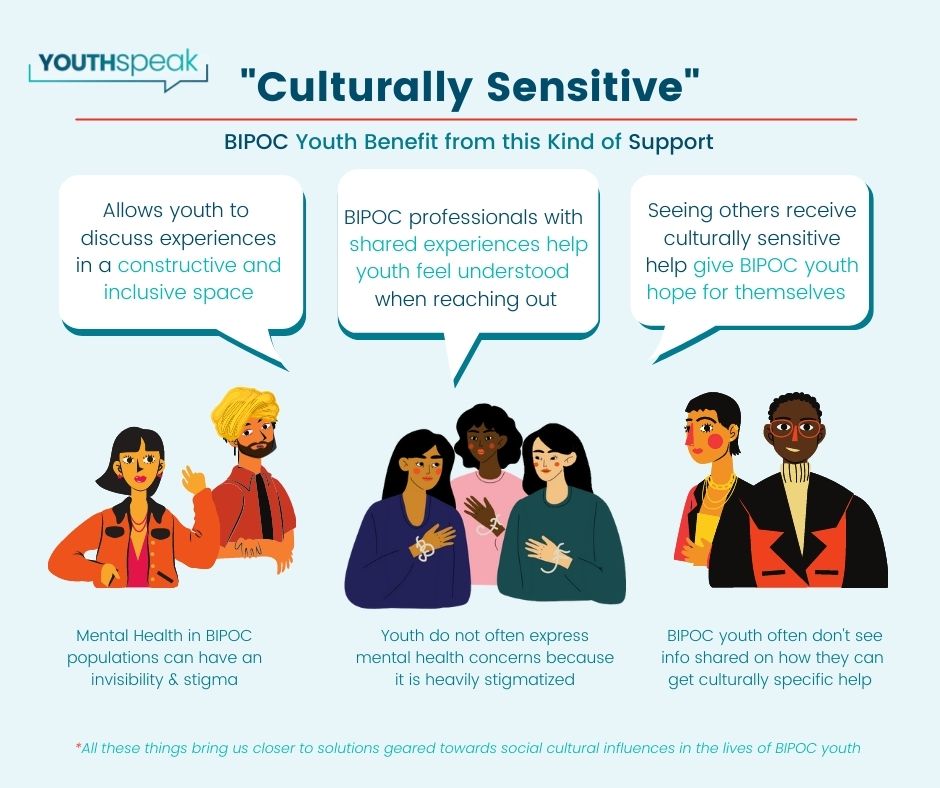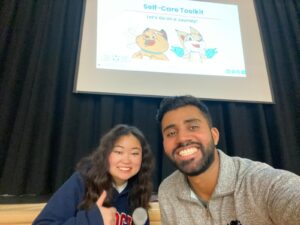Did you catch our July SpeakReal podcast? July was BIPOC (Black, Indigenous, People of Colour) Mental Health Awareness Month. Two of our amazing speakers, Jie and Hibba, spoke virtually to share what mental health means to them, respective of their cultural influences.
BIPOC individuals are often hesitant to reach out to professionals for mental health help. This hesitation is often related to the elders of BIPOC populations, questioning the legitimacy or sometimes even existence of mental health. Also, when seeking mental health help, many find that traditional coping tools of the western world are not always applicable to BIPOC populations. For anyone seeking professional mental health help, it is important to feel comfortable opening up to someone about their challenges. Mental health professionals must be culturally sensitive in their practice in order to better understand and help BIPOC populations, especially youth. Moreover, having more BIPOC professionals can provide a sense of relatability and comfortability for BIPOC youth who are seeking professional help, as they feel safe to speak, be heard and understood.
Intergenerational trauma can play a big role in mental health for many youth. Intergenerational trauma can result in children maturing at a younger age from trying to emotionally support their family. A common emotion among BIPOC is anger and feeling angry at the world. Some also feel resentment towards their family. In regards to mental health, it is common in BIPOC cultures to be told to not show emotions and to keep your feelings inside, especially negative feelings. Jie speaks to how for men in the family, mental health is especially not spoken about and the stereotype that men do not cry is very relevant. Hibba speaks to how for women, mental health can be a taboo subject that is hidden in fear of seeming mentally unstable or being labelled “insane”.

When struggling with mental health, coping tools are extremely important to use in order to manage everyday stress. Creative outlets, like music or art, are great tools for coping. Another great tool is programs designed for high-risk community members, where they can go when times are rough, especially if it is run by people within the community. This allows for young children to be around older kids in the same community and be reminded that they are strong and can get through what is happening in their life. Lastly, having friends who experience similar feelings helps one feel less alone. A strong sense of community and supporting one and another within the community is among the best tools a person, especially youth can have.
Watch this full podcast episode here:
At YouthSpeak, we share one-on-one conversations with our youth speakers on their journey through topics on mental health and wellness. These are their personal stories and ways they’ve overcome various obstacles in their lives. We want to help youth find their voices and empower themselves through the power of their narrative! To watch the whole podcast, check out our YouTube channel ‘YouthSpeak Performance Charity’: https://www.youtube.com/watch?v=Li5XWSVEIdE&t=749s
YouthSpeak is a charity organization based in the GTA, Canada that conducts assemblies and interactive workshops to help increase the resiliency of youth facing challenges today. To find out more about our projects and initiatives visit our website. Help support our For-Youth-by-Youth projects by donating at: https://youthspeak.ca/ or https://www.canadahelps.org/en/pages/i-support-youthspeak/






